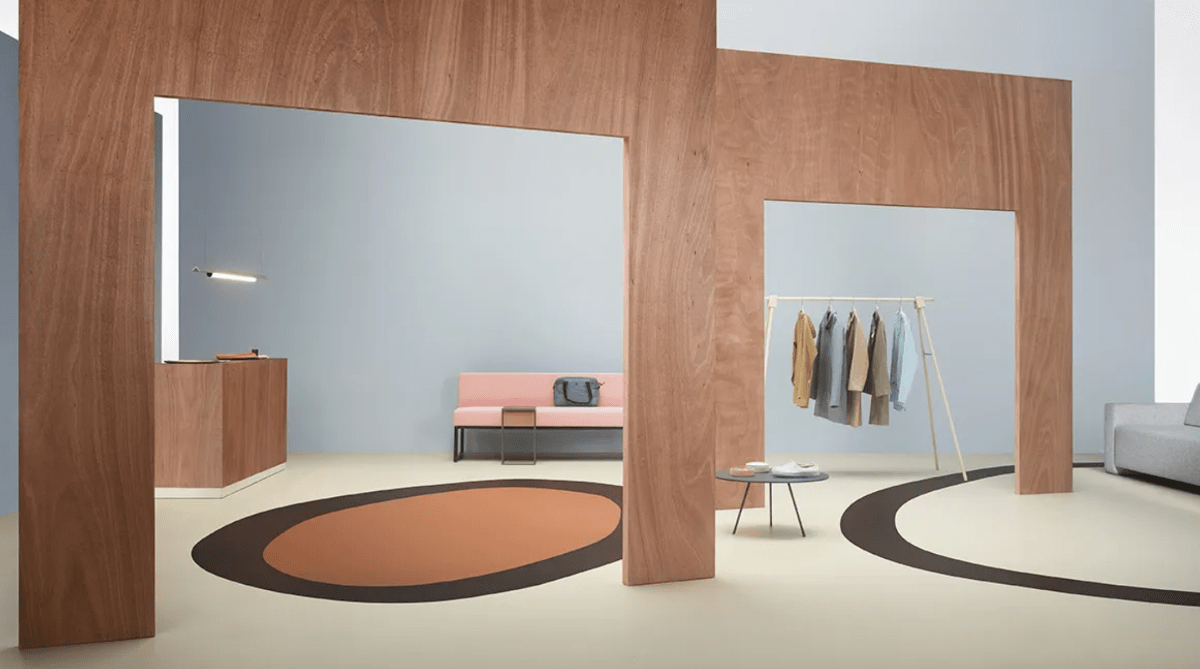Clean Commercial Environments: Antimicrobial & Antibacterial Flooring
Specialist Flooring Solutions
When it comes to maintaining a clean and hygienic environment, choosing the right flooring is crucial. In settings where bacteria and microbes are a concern, such as hospitals, laboratories, and food processing facilities, antimicrobial flooring is an excellent solution. This type of flooring is designed to inhibit the growth of bacteria, fungi, and other harmful microorganisms, ensuring a safer and healthier space for everyone. Although antibacterial, antimicrobial and bacteria resistant flooring solutions have been widely available for many years, it was the Covid-19 pandemic that brought the concept to more residential properties and expanded its use across different environments. Although the global pandemic is under much more control than during its height, it remains an ever present threat…alongside a number of other common conditions that we would want to avoid the spread of. As we approach flu season and the seasons turn colder, we look for solutions for the spread of viruses and bacteria that can be harmful to people using any number of spaces…both personal and commercial.
What is Antimicrobial Flooring?
Antimicrobial flooring is a specialised type of flooring that incorporates antimicrobial agents into its composition. These agents are designed to prevent the growth and spread of bacteria, mould, and mildew on the surface of the floor. By inhibiting the growth of these microorganisms, antimicrobial flooring helps to maintain a cleaner and more hygienic environment.
How Does Antimicrobial Flooring Work?
Antimicrobial flooring works by utilising various mechanisms to prevent the growth of bacteria and other microorganisms. One common method is the use of silver ions, which have natural antimicrobial properties. These ions are embedded into the flooring material and are released when they come into contact with moisture or organic matter, effectively inhibiting the growth of bacteria.
Another approach is the use of antimicrobial additives, such as quaternary ammonium compounds, which are blended into the flooring material during the manufacturing process. These additives create a hostile environment for microorganisms, preventing their growth and proliferation.
The Benefits of Antimicrobial Flooring
1. Enhanced Hygiene: Antimicrobial flooring significantly reduces the presence of bacteria, fungi, and other harmful microorganisms, minimising the risk of infections and diseases.
2. Durability: Antimicrobial flooring is designed to withstand heavy foot traffic, impact, and abrasion, ensuring long-lasting performance even in high-traffic areas.
3. Easy Maintenance: Antimicrobial flooring is easy to clean and maintain. Its smooth and non-porous surface prevents the accumulation of dirt, making it simple to keep the floor clean and free from contaminants.
4. Odour Control: By inhibiting the growth of bacteria and mould, antimicrobial flooring helps to control unpleasant odours, creating a more pleasant and comfortable environment.
Applications of Antimicrobial Flooring
Antimicrobial flooring is suitable for a wide range of applications, including:
- Healthcare facilities, such as hospitals, clinics, and nursing homes
- Laboratories and research facilities
- Food processing and manufacturing plants
- Schools and educational institutions
- Gyms and fitness centres
And more recently we have seen a trend towards retail and leisure spaces making use of these specialised flooring solutions - as well as instances of their use within home environments.
Antimicrobial flooring is a valuable solution for environments where bacteria and microbes pose a risk. By incorporating antimicrobial agents, this type of flooring inhibits the growth of harmful microorganisms, promoting a cleaner and safer space. With its durability, easy maintenance, and odour control properties, antimicrobial flooring is an excellent choice for various industries and settings. Consider antimicrobial flooring for your next project and enjoy the benefits of a hygienic and bacteria-resistant environment.
Every flooring project is unique and at Hamilton flooring we value the importance of understanding the needs of individual spaces, therefore we would always recommend contacting one of our professional flooring installation experts who are able to provide advice and give appropriate recommendations suited to your flooring requirements and budget. In the meantime, we will briefly introduce you to the world of antibacterial and antimicrobial flooring solutions and some of the amazing products which Hamilton Flooring works with.
Antibacterial and Antimicrobial Flooring: What is the Difference?
Put simply, both have the properties to inhibit the growth and spread of certain microorganisms such as bacteria, however antimicrobial flooring provides a wider scope as it can act as an antibacterial and antiparasitic product. Antimicrobial flooring is generally flooring which is created with added agents which shield and prevent the growth and spread of bacteria, fungus, parasites and viruses as well as mould, mildew and algaes - even some worms!
Floors with added antimicrobial agents are generally better protected than those which are covered with an antibacterial agent, as it defends against a much broader range of damaging organisms. Furthermore, manufactured antimicrobial flooring tends to have a top coating which provides a bacteria resistant barrier. This is not to say that antibacterial flooring is not effective. It is often the case that flooring types which can not be manufactured with antimicrobial materials will benefit from antibacterial coatings, particularly in cases where the flooring type is a natural material such as natural stone or tile.
Antimicrobial flooring is non-allergenic and also protects against common household allergens such as mould and mildew, it also has low to no VOC emissions. Flooring which is antimicrobial tends to be man-made (unless you are covering your floor in raw copper!) and as such is normally designed with additional characteristics such as water resistance, anti-slip technology and resistance to common corrosives.
Specialist Flooring Solutions at Hamilton Flooring
With so many options available, here are some highlights:
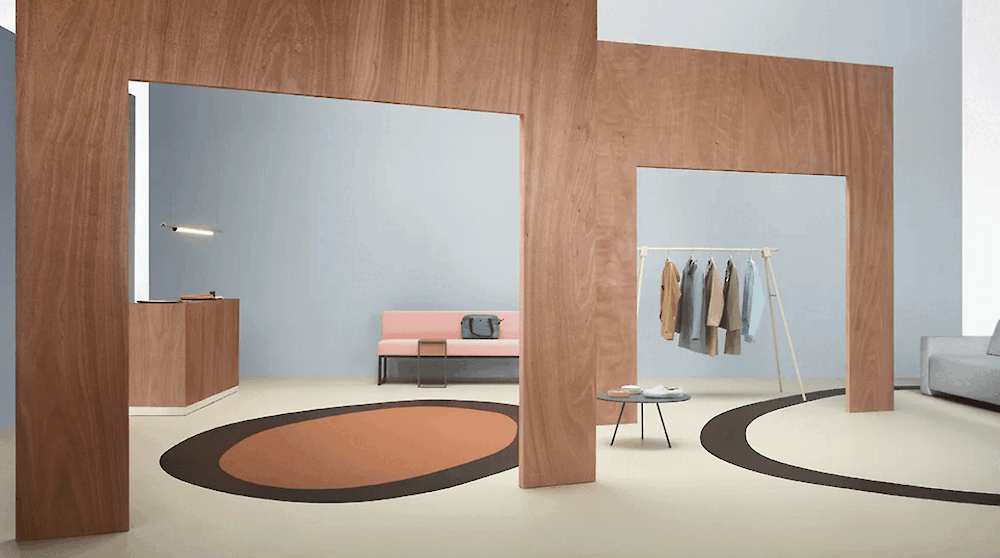
Forbo: Marmoleum Cocoa 3584 & 3581, Marmoleum Walton 3370
In addition to its natural bacteriostatic nature, Flotex and Marmoleum, both from Forbo Flooring Systems, have been awarded the prestigious “Seal of Approval” from Allergy UK as with the correct cleaning regime, they will not harbour allergens or house dust mites. With a recent report by Allergy UK estimating that there are at least 12 million people “allergic to their own home” - with 58% citing house dust mites as a key trigger the importance of floor coverings in creating better indoor environments should not be overlooked. It’s also an issue that shouldn’t be ignored by educational establishments.

Altro Atlas 40 is a heavy duty, 4mm industrial safety floor. It maintains integrity even through impact and puncturing from football studs and sports shoes with spikes.
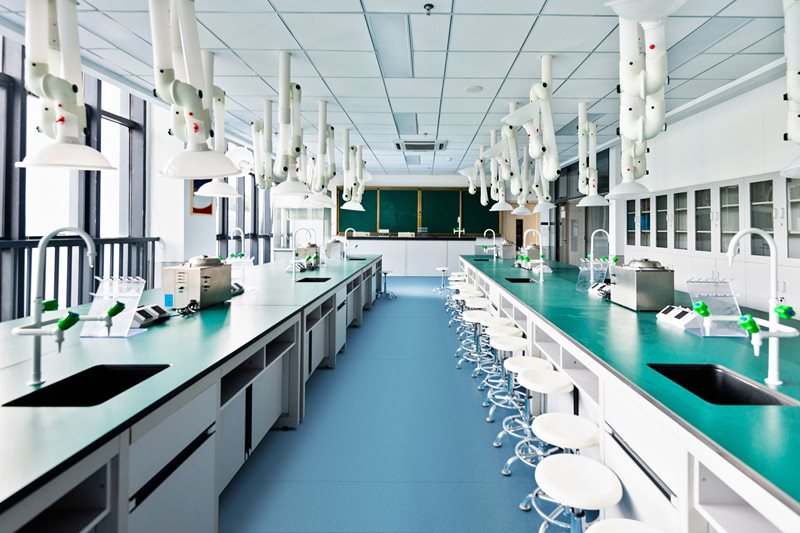
Stylishly tough 2.5mm safety – for public areas where hard-wearing, cleanable and stain-resistant products are essential. Added durability even with heavy foot and wheeled traffic. Great in hospital streets, laboratories, clinical areas, large atria / receptions.
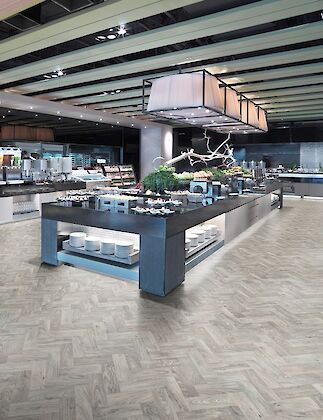
Polyflor Forest fx PUR PArish Oak Parquet
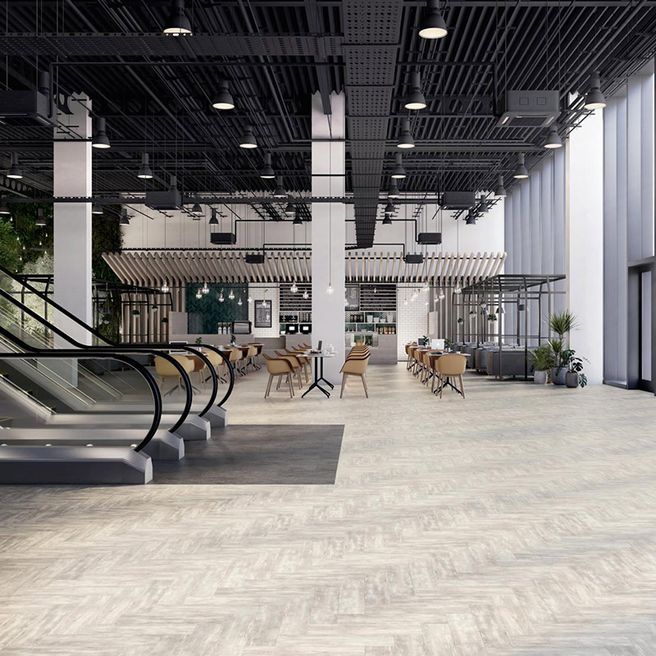
Amtico: Halo Pine laid in a Herringbone Pattern, paired with Stria Volcanic in a Broken Bond Laying Pattern - from the Amtico Signature 36+ collection.
Proven to reduce bacteria present by more than 99% over 24 hours - Tested with E.coli and MRSA in lab test conditions using ISO22196 method.
Hygiene Flooring at Hamilton Flooring
Hamilton Flooring has over three decades of experience in the flooring industry, we offer a full range of flooring services from residential to commercial and industrial. If you are looking for specialist flooring solutions, and in particular antimicrobial and antibacterial floors, please contact one of our team for more information.

